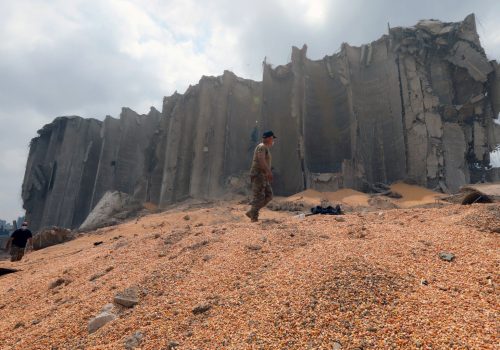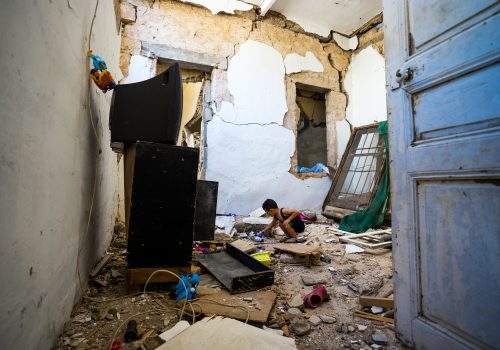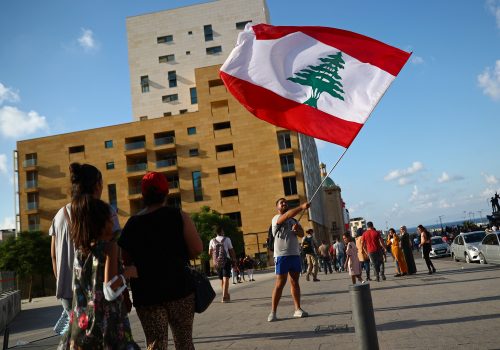It’s been a year since the Beirut blast. Now the unemployed are turning to tech.
One year ago, an earth-shattering blast rocked the streets of Beirut. Over two hundred people lost their lives and thousands more were injured when a devastating explosion slashed through the capital of Lebanon. The blast was caused by a cache of nearly 2,750 metric tons of explosive chemicals improperly stored for years at the city’s port.
Thousands of homes and businesses were destroyed, and the cleanup effort has since been hampered by a failed government, a collapsing local currency, protests, COVID-19, a debilitated healthcare system, and frequent food, water, fuel, and power shortages. The country’s diverse population of over six million Lebanese, Palestinian, and Syrian refugees, as well as around 250,000 migrant domestic workers, continue to suffer. Having lost 90 percent of its value since October 2019, the Lebanese pound has left most people unable to afford basic necessities.
Just two days before the devastating explosion in 2020, a cohort of twenty-seven newly qualified, full-stack web developers were graduating from a six-month coding and leadership course at the Codi offices in Gemmayzeh, Beirut. Their sector may be one of the only fields of employment that has been relatively unaffected by the country’s political and socio-economic crisis.
According to Codi, a free programming school for underprivileged youth, 85 percent of their developer graduates are employed within the first three months of graduation, earning an average of $1,050 per month in cash. Around half are employed as web developers and project managers at tech companies abroad—such as Coddict, Microsoft, and Wunderman Thompson—in the Gulf, United States, and Europe.
Hortense Decaux, founder of Codi, says: “Globally, it is estimated that there are ten times as many roles for developers as there are qualified people to fill those roles. That statistic is even higher in the [Middle East and North Africa] region.”
Coding and other tech professions are one way for Lebanon’s 1.5 million Syrian refugees to circumvent the country’s restrictive labor laws that only permit Syrians to work in the agriculture, construction, and cleaning sectors. According to a recent report by Syrian-founded non-governmental organization (NGO) Jusoor and SPARK, 88.2 percent of Syrians are currently working in the informal sector in Lebanon.
SPARK, an international development NGO and partner of Codi, is supporting vulnerable youth in Lebanon—including Syrian refugees—through long-term, sustainable employment. SPARK provides market-relevant higher education scholarships, links youth to internships, and offers entrepreneurship training and access to finance for promising startups in tech.
24% of our alumni are Syrians. However, of our current cohorts in Beirut and Tripoli, 9% are Syrians.
Mahmoud Joukmara, a Syrian computer business graduate from one of SPARK’s scholarships, is now a web developer. He is one of the 24 percent of Syrian refugee alumni. He is also the sole breadwinner for his family of seven.
Joukmara explains, “This is the only way to work legally because it’s using a laptop and it’s remote. I could sit under a tree and work. I work in Borj El Brajneh camp, where there are a large number of Syrians. I’d like to open a computer development skills center there.” At the moment, 24 percent of Codi’s alumni are Syrian.
Since the blast and subsequent crises, Codi has seen an increased number of Lebanese applicants for their courses. Of that number, 35 percent of students are women.
“Education is big in Lebanon. However, after the blast, a huge pool of young people who were going to do a bachelor’s or study abroad had their prospects shattered forever,” notes Hortense. “Having to dedicate three-four years, at vast expense, is just a luxury that most people cannot afford anymore.”
Globally, education trends are shifting. Degrees from traditional higher education institutes no longer guarantee employment upon graduation, and many qualifications once seen as prestigious, such as engineering, do not reflect the real needs of local labor markets.
Chriss, a Lebanese developer and Codi alumnus, says: “After spending three years in the university and being jobless, applying to Codi was the best decision I have ever made. In the course of less than four months, even though I’ve relearned most of the things I learned at the university, Codi gave it more value, because it’s in actual projects and not just pen and paper.”
More and more young people are turning towards shorter, skills-based, or vocational courses that offer real-life work experience to be better equipped for the world of work. The coronavirus pandemic has only accelerated this trend, with blended learning options providing greater flexibility and opportunities for vulnerable populations, like refugees.
The situation in Lebanon post-blast remains dire and many tech workers also suffer from unreliable 4G connectivity, electricity outages, high costs of living, and post-traumatic stress. This is where organizations like SPARK and Codi step in to provide vulnerable youth with the digital, soft, and language skills to support themselves in the future, despite the rapidly changing and fragile situations they live in.
Sarah Page is a communications manager at SPARK, an international development NGO in Lebanon.
Image: Mahmoud Joukmara, Syrian developer, working from his home in Beirut, Lebanon © 2021, Tom Nicholson, SPARK


